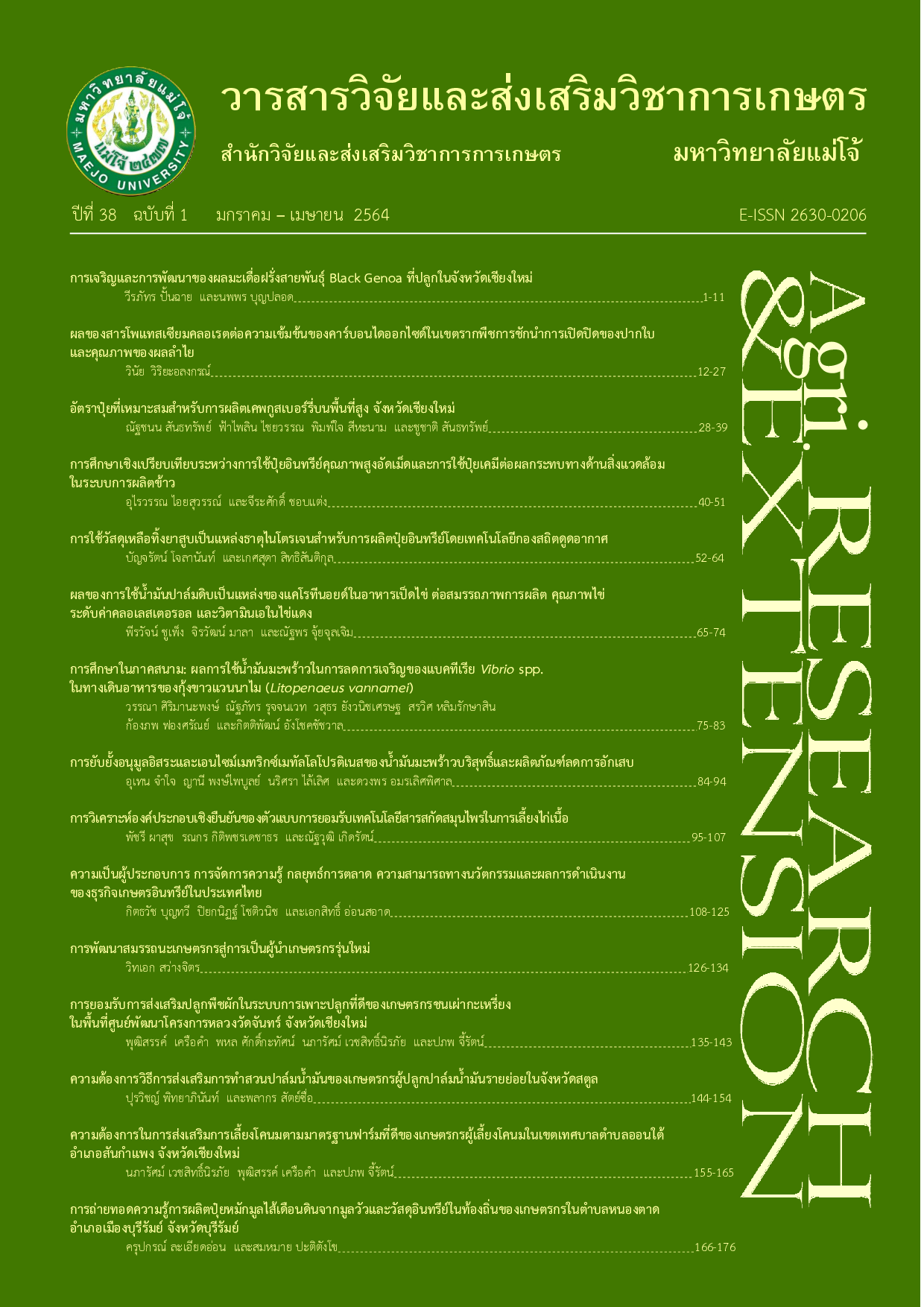การพัฒนาสมรรถนะเกษตรกรสู่การเป็นผู้นำเกษตรกรรุ่นใหม่
คำสำคัญ:
สมรรถนะ, การพัฒนาสมรรถนะ, เกษตรกรรุ่นใหม่บทคัดย่อ
การวิจัยนี้มีวัตถุประสงค์ คือ 1) เพื่อพัฒนาสมรรถนะและจัดกิจกรรมการเรียนรู้การพัฒนาผู้นำเกษตรกรรุ่นใหม่ และ 2) เพื่อประเมินระดับการปฏิบัติของตนเองสู่การเป็นผู้นำเกษตรกรรุ่นใหม่ ดำเนินการวิจัยและพัฒนากลุ่มตัวอย่าง คือ ผู้แทนจากหน่วยฝึกอบรมซึ่งเป็นคณาจารย์จากวิทยาลัยเกษตรและเทคโนโลยีทั้ง 7 แห่ง ร่วมกับผู้ทรงคุณวุฒิ ได้แก่ ผู้บริหารจากสำนักงานการปฏิรูปที่ดินเพื่อเกษตรกรรม (ส.ป.ก) จำนวน 3 ท่าน รวม 10 ท่าน และผู้เข้าร่วมการอบรมในโครงการตามหลักสูตรการพัฒนาผู้นำเกษตรกรรุ่นใหม่ รุ่นที่ 14 ของ ส.ป.ก. จำนวน 66 คน โดยออกแบบเครื่องมือการประเมินตนเองสู่สมรรถนะการเป็นผู้นำเกษตรกรรุ่นใหม่ วิเคราะห์ข้อมูลโดยวิธีการจัดลำดับความสำคัญของข้อมูล การสังเคราะห์ข้อมูล และสถิติเชิงพรรณนา ผลการวิจัยพบว่าผู้เข้าร่วมการอบรมในโครงการมีระดับการปฏิบัติตามสมรรถนะการเป็นผู้นำเกษตรกรรุ่นใหม่ ประกอบด้วย 1) การดำรงชีวิตและการอยู่ร่วมกันในกลุ่มและชุมชน 2) ความรู้พื้นฐานทางการเกษตร 3) การเรียนรู้เพื่อการพัฒนาอาชีพเกษตร 4) การจัดการการผลิตและผลิตผลตลอดห่วงโซ่ 5) การวิเคราะห์ทางเลือกอาชีพเกษตร 6) การบริหารจัดการตลาดและเครือข่าย และจากการสนทนากลุ่มและการวิจัยมีข้อสรุปว่า ผู้เข้ารับการอบรมมีสมรรถนะการเป็นผู้นำเกษตรกรรุ่นใหม่ สามารถลงพื้นที่เกษตรของ ส.ป.ก. และสามารถดำเนินการด้านการเกษตรได้
เอกสารอ้างอิง
Agricultural Land Reform Office. n.d. Cooperation for New Generation Agricultural. pp 66-67. In Young Farmers with Sustainable Agricultural Management. Bangkok: Agricultural Land Reform Office. [in Thai].
Akasing, M., P. Saiphothong and C. Chaiyuphup. 1996. Selection of Suitable Areas for Fish Farming in Rice Fields by using the Geographic Information System pp. 174-185. In Report of the 11th Seminar on Farming Systems: Agricultural Systems for Farmers, Environment and Sustainability. Bangkok: Department of Agriculture. [in Thai]
Akasing, M., B. Akasing, K. Ngamsomsuk and K. Thongngam. 2007. Application of Hierarchical Analysis Process (AHP) in Deciding to Choose Organic Vegetables for farmers. pp. 55-65. In Annual Academic Conference of the Agricultural Productivity Research Center, September 7-8, 2007. Chiang Mai: Chiang Mai University. [in Thai]
Division of Technology Policy for Agriculture and Sustainable Agriculture. 2014. 123 alternative farming professionals. [Online]. Available https://esc.doae.go.th/wp-content/uploads/2018/08/123job.pdf (3 March 2020). [in Thai]
Drucker, P.F. 1999. Management Challenges for the 21st Century. New York: Harper Business. 207 p.
Likert, R.A. 1932. Technique for the measurement of attitudes. Arch Psychological 25(140): 1-55.
Michiel R. P. Leenders, J. Fraser, A.E. Flynn and H.E. Fearon. 2006. Purchasing and Supply Management with 50 Supply Chain Cases. 13thed. Singapore: McGraw-Hill. 564 p.
Siamrathonline. 2018. Scoop/Agricultural Land Reform Office: Open course. "Developing a new generation of farmers" to enhance the Thai agricultural sector strength. [Online] Available https://siamrath.co.th/n/46044 (8 March 2020). [in Thai]
Smart Farmer and Smart Officer Policy Steering Committee, Ministry of Agriculture and Cooperatives. 2013. Policy guide for smart farmer and smart officer policies, part 1. [Online]. Available http://www.farmdev.doae.go.th/data/farmers-group/Smart%20farmer.pdf (8 March 2020). [in Thai]
Streiner, D.L. and G.R. Norman. 1995. Health Measurement Scales: A Practical Guide to Their Development and Use. 2nded. Oxford: Oxford University Press. 418 p.
Sufficiency Economy Steering Committee Office of the National Economic and Social Development Board. 2006. What is Sufficiency Economy?. Bangkok: Sufficiency Economy Group, Office of the National Economic and Social Development Board. 35 p. [in Thai].
ดาวน์โหลด
เผยแพร่แล้ว
รูปแบบการอ้างอิง
ฉบับ
ประเภทบทความ
สัญญาอนุญาต
บทความนี้ได้รับการเผยแพร่ภายใต้สัญญาอนุญาต Creative Commons Attribution-NonCommercial-NoDerivatives 4.0 International (CC BY-NC-ND 4.0) ซึ่งอนุญาตให้ผู้อื่นสามารถแชร์บทความได้โดยให้เครดิตผู้เขียนและห้ามนำไปใช้เพื่อการค้าหรือดัดแปลง หากต้องการใช้งานซ้ำในลักษณะอื่น ๆ หรือการเผยแพร่ซ้ำ จำเป็นต้องได้รับอนุญาตจากวารสาร





